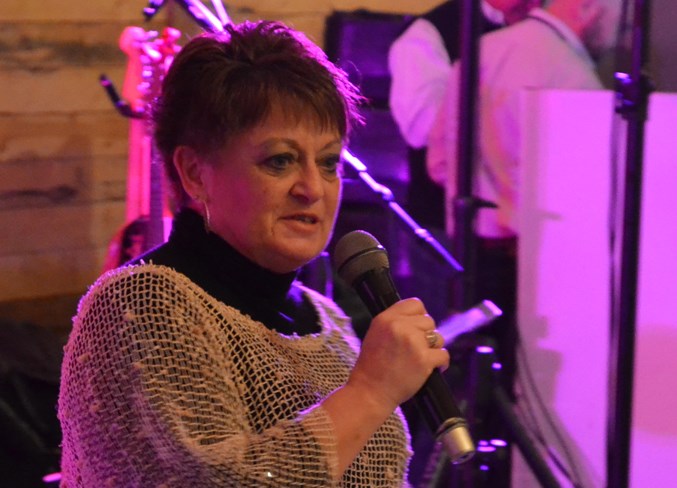Marvell McAmmond and her husband were thrilled when two children came into their lives.
But they soon became overwhelmed when their daughter, Dawsyn, 17, had her first seizure at six months of age.
"We hoped it was an anomaly and we would never, ever see it again. But it did and it does, every day," she said in a speech during a Hope 4 MVC Kids fundraiser at the Willow Lane Barn, east of Olds.
At two years old, Dawsyn was diagnosed with Drevay's syndrome.
It's a rare condition featuring uncontrollable epilepsy and those who have it have a "very, very poor prognosis," McAmmond said.
"Children with Drevay's syndrome have seizures that are very difficult -- if not impossible -- to fully control," she said. "They're typically severely cognitively impaired and often have an accompanying diagnosis of autism."
In addition she said, they are always in danger of suddenly dying for reasons that can be unexplained.
"At the time of the diagnosis, the team of doctors told us what we could expect for the remainder of Dawsyn's life. Now, all these years later, that information that we received that day didn't even scratch the surface," McAmmond said.
"It costs approximately seven times as much to raise a child with a long-term disability as it does a typical child."
McAmmond said those costs "include but they're not even remotely limited to -- constant travel to medical appointments and hospital stays, out-of-pocket expenses for medications that your child absolutely has to have but insurance doesn't cover."
Other costs include adaptive furniture, modifications to the home such as a chairlift or a walk-in shower, as well as mobility equipment like walkers, wheelchairs, or a specially modified bicycle and helmet. Communication devices also have to be purchased.
"One parent often has to forego their career to stay at home and be on call 24-7. We became really, really grateful for whatever assistance was available to us," McAmmond said.
Those are just the financial costs.
"We were totally unprepared for the astounding number of hours we would spend applying for and completing monthly paperwork for organizations like the family support for children with disabilities," McAmmond said.
"And just when we think that we've got it all figured out, then we have to turn around and apply to be guardians of our own children because they're becoming adults. So now we're looking at a whole new system of financial support."
There's also a social cost to raising a child like Dawsyn, McAmmond said.
"As our lives become more and more complicated and complex, we discover that many friends start dropping off our radar," she said.
She said when they're invited out, they often have to cancel for many reasons, including "just because we are too exhausted to get out of our pyjamas."
"Eventually the invitations stop coming and our circle gets even smaller," McAmmond said. "Family isolation is one of the biggest costs of raising a chronically ill child."
The passing of various milestones is another source of sorrow.
"We didn't know that we would experience grief upon grief as we watched other children reach milestones that Dawsyn never will," McAmmond said.
"Our next (one) will occur this coming June when all those little five-year-olds that she started kindergarten with are going to march across the stage and receive their high school diplomas, and she won't be among them.
"This mom is not going to be out shopping for a grad gown or a wedding gown and daddy will not be walking baby girl down an aisle."
Dawsyn's diagnosis has also had an effect on their son, who is now an adult.
"We didn't know that more times than we can count, the typical sibling was going to be put on the back burner so we could deal with an emergency situation, an unexpected anxiety attack, a meltdown, or a seizure," McAmmond said.
"And they have no idea that we -- mother, father and brother -- would one day suffer chronic caregiver fatigue, depression and anxiety attacks.
"For many of us, in the depths of lifelong caregiving, we are just barely treading water. Our energy has no reserve. It's drained on a regular basis and we spend most of our days running on empty," she added.
Fortunately, McAmmond said, Hope 4 MVC Kids has assisted the family in many ways, including helping with travel expenses and meals for medical appointments and hospitalizations.
They have also provided adaptive equipment for use at home and at school as well as occupational and physical therapies when required.
They also provide financial assistance for many other expenses, including counselling and alternative therapies not covered by health insurance.
They also help cover the cost for medication to stop Dawsyn's prolonged seizures.
That too is not covered by insurance and costs more than $300 a dose, McAmmond said.
"For safety's sake, we have six doses on hand at any given time," she said. "We can honestly say that having this medication at our fingertips has saved her life more than once, and that's thanks to Hope 4 MVC Kids."
"Our family and so many others are so genuinely thankful for Hope 4 MVC Kids. Lisa and the board have first-hand knowledge of our struggles and are willing and able to share valuable and appropriate resources," McAmmond said.
"Thank you for all you do to make the lives of sick, injured and chronically ill children -- and their families -- just a little bit easier. You are a blessing to us and to our community."



